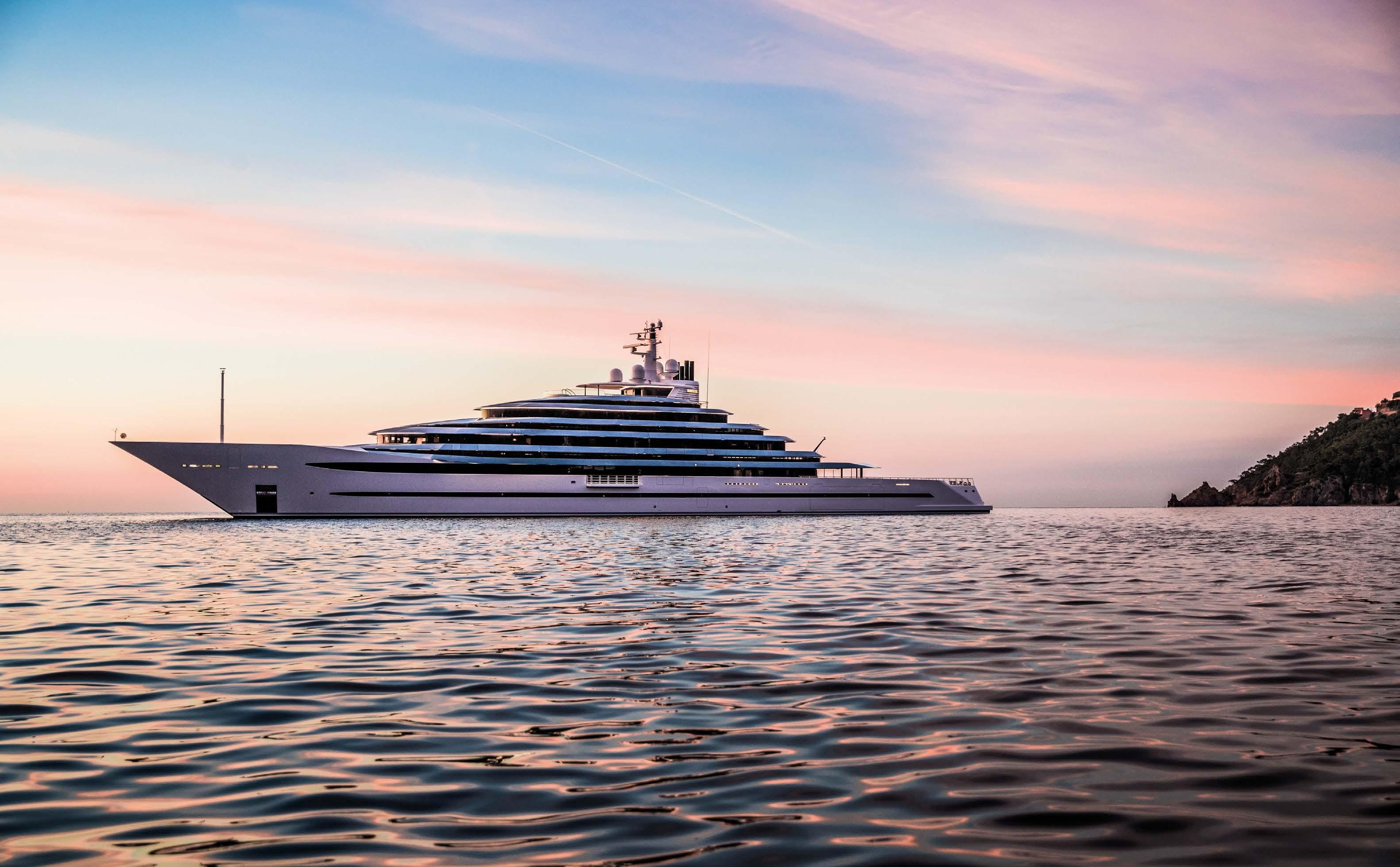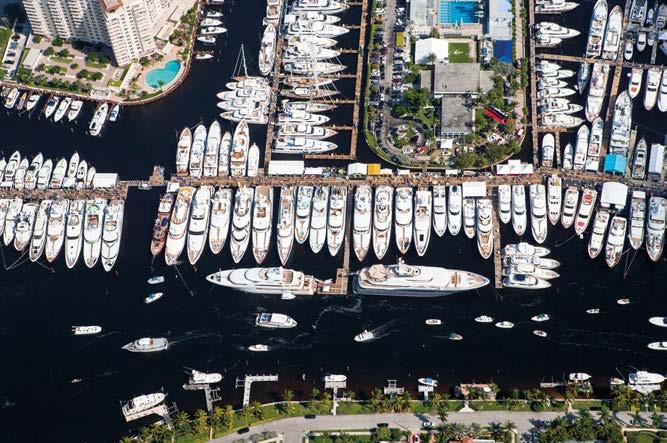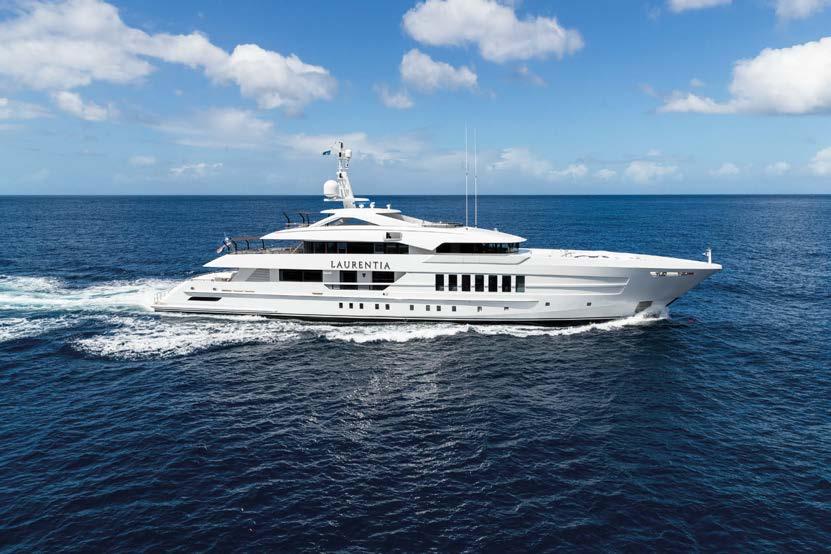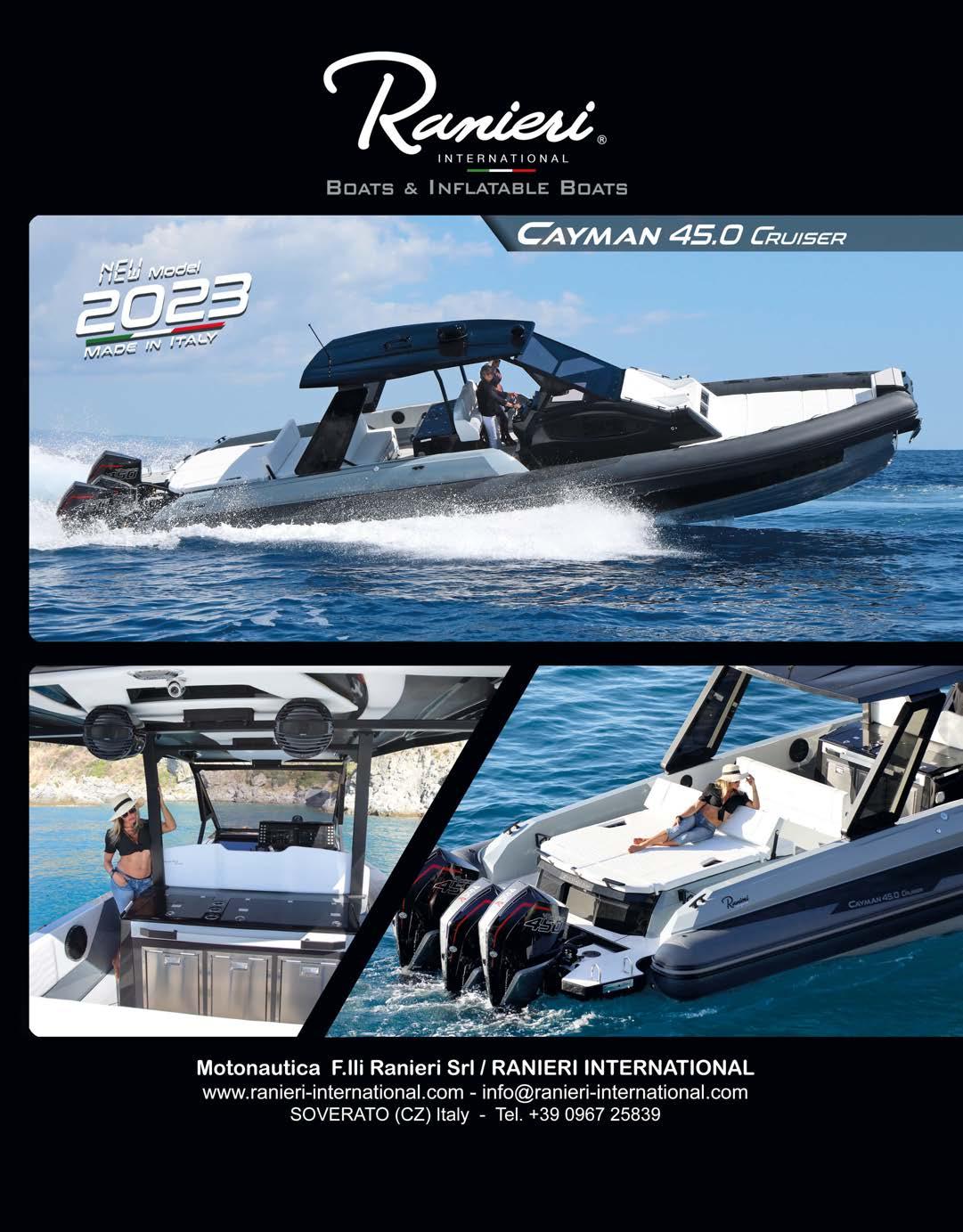
11 minute read
Lawyer on Board – Avvocato a bordo
The Central Agency Sales Agreement
NORMALMENTE, AL TERMINE DELLA STAGIONE ESTIVA, GLI ARMATORI DECIDONO SE TENERE IL PROPRIO YACHT OPPURE SE METTERLO SUL MERCATO ED ACQUISTARNE UNO NUOVO AT THE END OF THE SUMMER, OWNERS USUALLY DECIDE WHETHER TO KEEP THEIR YACHT FOR ONE MORE SEASON OR PUT IT ON THE MARKET AND BUY A NEW ONE by Federico Santini*
In un momento di boom come quello che il mercato della nautica sta vivendo da un anno a questa parte, la domanda di yacht usati disponibili supera addirittura l’offerta e ciò ha avuto l’effetto di spingere anche armatori indecisi a mettere in vendita il proprio yacht per realizzare il miglior prezzo possibile e ricercare una nuova opportunità di acquisto. In questo ambito, l’importanza per l’armatore di avere un buon Central Agency Sales Agreement è decisiva considerando che la compravendita di yacht usati a livello internazionale si realizza quasi esclusivamente attraverso i broker e nella stragrande maggioranza dei casi attraverso mandati in esclusiva. In generale, il Central Agency Sales Agreement è un accordo di mandato attraverso il quale l’armatore conferisce al broker l’esclusiva a livello mondiale per un certo periodo di tempo per la vendita del proprio yacht ad un certo prezzo ed a determinate condizioni. I principali broker internazionali aderenti all’associazione MYBA (Mediterranean Yacht Brokers Association) adottano un formato standard di accordo che, tuttavia, è suscettibile di negoziazione su richiesta dell’armatore. È allora importante per l’armatore individuare gli aspetti più importanti del contratto e, possibilmente, chiedere la consulenza di un legale esperto della materia ai fini della revisione e definizione del contratto. Chiaramente il tema più importante è banalmente il livello di commissioni che l’armatore si impegna a corrispondere al Central Agent in caso di vendita. La commissione standard a livello MYBA è il 10% del prezzo lordo di vendita ma non è infrequente che tale percentuale elevata venga ridotta in assoluto ovvero, a seconda dei casi, venga prevista una percentuale decrescente per scaglioni di prezzo laddove il prezzo di vendita finale accettato dall’armatore sia più basso di quello minimo fissato in contratto. Il contratto infatti deve fissare un prezzo di vendita “target” che l’armatore si impegna ad accettare in presenza di un’offerta vincolante, laddove in caso di offerta vincolante ad un prezzo inferiore l’armatore sarà libero di accettare o meno. Accade inoltre nella pratica che, nonostante l’esclusiva concessa, l’armatore si riservi il diritto di vendere a determinati soggetti non introdotti dal Central Agent, già noti all’armatore o facenti parte della sua cerchia di

conoscenti, nel qual caso la commissione al Central Agent sarà del tutto esclusa oppure sostanzialmente ridotta. Va detto che la commissione pattuita nel Central Agency Sales Agreement include la commissione del Central Agent e quella del broker che abbia segnalato l’acquirente al Central Agent. Al riguardo è consigliabile per l’armatore inserire nel contratto una clausola di indennizzo a carico del Central Agent che tenga l’armatore al riparo da eventuali richieste di broker terzi con i quali il Central Agent sia venuto in contatto per la vendita dello yacht. Altro tema estremamente importante è la durata dell’esclusiva: è importante fissare un termine ragionevole che, da un lato, consenta al Central Agent di pubblicizzare adeguatamente lo yacht e di sfruttare adeguatamente i propri canali per reperire offerte di acquisto competitive, ma che d’altro lato spinga il broker a lavorare subito e bene e non vincoli l’armatore per un tempo eccessivo laddove, in mancanza di offerte soddisfacenti, l’armatore perda fiducia nel broker. Nella pratica il periodo di esclusiva è mediamente di 12 mesi, ma non è infrequente un termine inferiore. Tra gli impegni del Central Agent vi è naturalmente quello di proporre in maniera adeguata lo yacht sul mercato, attraverso la diffusione di informazioni relative alla vendita sul proprio sito istituzionale, sui social e su riviste specializzate. Dal punto di vista dell’armatore è consigliabile porre a carico del Central Agent tutti i costi di marketing in modo da farli rientrare nella commissione, salvo eventualmente prevedere un suo contributo alle spese in caso di iniziative particolari che potranno di volta in volta essere concordate con l’armatore, quali ad esempio la partecipazione a fiere o eventi.
I PRINCIPALI BROKER INTERNAZIONALI ADERENTI ALL’ASSOCIAZIONE MYBA (MEDITERRANEAN YACHT BROKERS ASSOCIATION) ADOTTANO UN FORMATO STANDARD DI ACCORDO CHE, TUTTAVIA, È SUSCETTIBILE DI NEGOZIAZIONE SU RICHIESTA DELL’ARMATORE. LEADING INTERNATIONAL YACHT BROKERS WHO ARE MEMBERS OF MEDITERRANEAN YACHT BROKERS ASSOCIATION (MYBA) ADOPT A STANDARD CENTRAL AGENCY SALES AGREEMENT FORMAT APPROVED BY THE ASSOCIATION, WHICH, HOWEVER, IS OPEN TO NEGOTIATION AT THE SHIPOWNER’S REQUEST.

Altro impegno del Central Agent è ovviamente quello di accompagnare i potenziali acquirenti nelle visite a bordo, di interagire con i broker dell’acquirente e di seguire la trattativa sia in fase negoziale, dalla formulazione dell’offerta vincolante alla sottoscrizione del MOA, sia in fase di esecuzione del MOA (Memorandum of Agreement), durante le prove in mare e l’ispezione a secco ed, in caso di esito positivo di queste con conseguente accettazione dello yacht, in sede di perfezionamento della vendita. Dal canto suo, in aggiunta all’obbligo di esclusiva, gli impegni dell’armatore includono tra l’altro: 1) la fornitura al Central Agent di fotografie, informazioni e specifiche tecniche dello yacht, la descrizione dei relativi allestimenti; 2) la disponibilità a far visionare lo yacht ai potenziali acquirenti con modalità e preavvisi da concordare; 3) l’impegno a veicolare attraverso il Central Agent eventuali richieste di acquisto dovessero pervenire direttamente all’armatore stesso ovvero al suo equipaggio. Una clausola standard per ovvie ragioni è poi quella che obbliga l’armatore al pagamento della commissione nell’ipotesi in cui entro un certo termine dalla scadenza o risoluzione del Central Agency Sales Agreement la proprietà dello yacht sia trasferita, in qualsiasi forma, a favore di un soggetto che era stato introdotto dal Central Agent.
During a boom like the one the yachting market has been experiencing for the past year, the demand for available used yachts exceeds the supply and this has pushed undecided owners to sell in order to get the best price and to seek a new buying opportunity. In this regard, the importance for the shipowner to have a good and effective Central Agency Sales Agreement is decisive considering that the buying and selling of used yachts internationally is done almost exclusively through brokers and in the vast majority of cases through exclusive mandates. In general, a Central Agency Sales Agreement is a mandate by which the owner gives the broker worldwide exclusivity for a certain period of time to sell the yacht at a certain price and under certain conditions. Leading international brokers who are members of the Mediterranean Yacht Brokers Association (MYBA) adopt a standard agreement format, which, however, is

open to negotiation at the shipowner’s request. Therefore, it is important for the shipowner to understand the most important aspects of the contract and, possibly, seek the advice of a legal expert in the field to review and define the contract. Clearly, the most important issue is trivially the amount of commission that the shipowner agrees to pay the Central Agent in the
Tra gli impegni del Central Agent vi è naturalmente quello di proporre in maniera adeguata lo yacht sul mercato, attraverso la diffusione di informazioni relative alla vendita sul proprio sito istituzionale, sui social e su riviste specializzate. event of a sale. At MYBA level, the standard commission is 10% of the gross sales price but it is not uncommon for this high percentage to be reduced in absolute terms or, as the case may be, for a decreasing percentage to be set by price brackets where the final sale price accepted by the shipowner is lower than the minimum sales price set in the contract. In fact, the Central Agency
Of course, among the Central Agent’s commitments is to adequately market the yacht through the dissemination of sale-related information on his or her official website, social networks and in specialized magazines. Sales Agreement must set a “target” sales price that the shipowner agrees to accept in the presence of a binding offer; while if a binding offer is made at a lower price, the shipowner will be free to accept or not. Furthermore, in actual practice a shipowner may reserve the right to sell to certain buyers not introduced by the Central Agent, who are already known to the shipowner or are port of his or her circle of acquaintances, in which case the commission to the Central Agent will be either excluded altogether or substantially reduced. It is worth mentioning that the commission agreed upon in the Central Agency Sales Agreement includes the commission of the Central Agent and that of any broker (sub-listing broker) who introduced the buyer to the Central Agent. In this regard, however, the shipowner is advised to include an indemnification clause in the contract to be paid by the Central Agent, which will keep the shipowner safe from any claims


Santini & Partners Studio Legale 25, Via Tommaso Salvini Rome - 00197 info@santinipartners.it www.santinipartners.it Tel: +39 06 97886-598/599 Mob.: +39 335 8118884 Fax: +39 06 97886606

L’avvocato Federico Santini è managing partner dello Studio Legale Santini & Partners di Roma. È specializzato in diritto internazionale ed in diritto marittimo, ha una consolidata esperienza nel settore dello yachting, con particolare riguardo a transazioni relative a super yacht, nuove costruzioni navali, finanziamento per la costruzione di navi, registrazione di yacht, arbitrati internazionali, questioni assicurative e fiscali connesse. È membro dell’Associazione Italiana di Diritto Marittimo ed è consulente di primari studi legali, di istituzioni ed associazioni internazionali nel settore dello yachting. Per qualsiasi richiesta di chiarimenti e/o assistenza scrivere a: f.santini@santinipartners.it

The lawyer Federico Santini is a managing partner of Santini & Parterns Law office in Rome. He is specialized in international law and maritime law and has a consolidated experience in the yachting field especially in terms of super yacht transactions, the registration of yachts, international arbitration, insurance issues and related tax. He is a member of the Italian Association of Maritime law and advisor of the most important law offices and of the international yachting associations. For any requirement or information, please write to: f.santini@santinipartners.it by third-party brokers with whom the Central Agent has come into contact for the sale of the yacht or otherwise involved in the sale. Another extremely important issue is the duration of the exclusivity; a reasonable term should be set that, on the one hand, pushes the broker to work quickly and well and does not bind the shipowner for an excessive amount of time where, in the absence of satisfactory offers, the shipowner loses confidence in the broker. The exclusivity period is, on average, 12 months, but a shorter term is not uncommon. The Central Agent’s commitments include, of course, adequately pitching the yacht to the market, through dissemination of information about the sale on his or her official website, social networks and in specialized magazines. It is advisable, from the shipowner’s point of view, to place all marketing and advertising costs at the Central Agent’s expense so that they are included in the commission, except possibly providing for his or her contribution to expenses for special initiatives that can be agreed upon with the shipowner from time to time, such as participating in fairs or events. Other commitments of the Central Agent are, of course, to accompany potential buyers on their visits on board, to interact with the buyer’s broker and to follow the negotiations both during the negotiation phase, from the formulation of the binding offer to the signing of the MOA (Memorandum of Agreement), and during the execution if the MOA (Memorandum of Agreement), during the sea trials and dry inspection and, in case of a positive outcome of these resulting in the acceptance of the yacht, when finalizing the sale. For his or her part, in addition to the obligation of exclusivity, the shipowner’s obligations include, among others: 1) providing the Central Agent with photographs, information and technical specifications of the yacht, including its lay-out and accessories; 2) the willingness to have the yacht viewed by the potential buyers in a manner and with advance notice to be agreed upon; 3) the commitment to convey through the Central Agent any purchase requests should they be received directly by the shipowner or his or her crew. For obvious reasons, a standard clause normally included in a Central Agency Sales Agreement obligates the shipowner to pay commission to the Central Agent if, after the expiration or termination of the Central Agency Sales Agreement, ownership of the yacht is transferred, in any form, to a party who had been introduced by the Central Agent.
Il Central Agency Sales Agreement è un accordo di mandato attraverso il quale l’armatore conferisce al broker l’esclusiva a livello mondiale per un certo periodo di tempo per la vendita del proprio yacht ad un certo prezzo ed a determinate condizioni. The Central Agency Sales Agreement is a mandate through which the shipowner grants the broker the worldwide exclusive right to manage the sale of the yacht for a certain period of time to sell his or her yacht at a certain price and under certain conditions.













